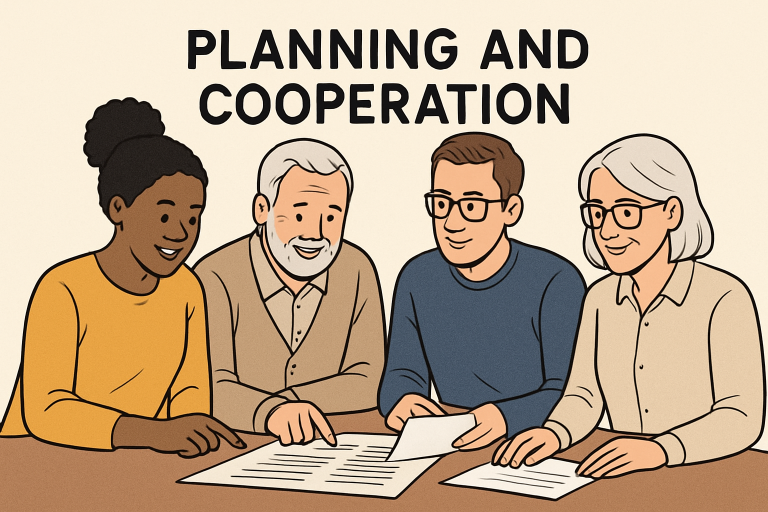Table of Contents
- Introduction
- Understanding Estate Planning
- Key Components of an Estate Plan
- Protecting Your Loved Ones
- Avoiding Probate
- Planning for Incapacity
- Minimizing Taxes and Expenses
- Common Misconceptions About Estate Planning
- Getting Started with Your Estate Plan
Many adults mistakenly believe that estate planning is relevant only for those with extensive assets or significant wealth. In reality, having an estate plan is a critical step for anyone seeking to protect their loved ones and ensure that their wishes are honored, regardless of financial status. Failing to prepare an estate plan can lead to unnecessary complications, increased legal expenses, and emotional distress for family members. To avoid these pitfalls, it’s wise to seek guidance from experienced estate and probate lawyers Ridgewood, NJ who can help navigate the nuances of the process.
Even modest estates can face disputes without proper planning. A solid estate plan lets you decide who inherits your assets, appoint guardians, and prevent family conflicts. Through wills, trusts, and directives, anyone can secure their legacy and peace of mind. Planning is an act of care for yourself and your loved ones, as the unexpected can happen at any time. Take steps now to ensure your wishes are clear and legally binding. For more guidance, organizations like AARP offer helpful estate planning resources.
Understanding Estate Planning
At its core, estate planning is about creating a roadmap for managing and distributing your assets. This process covers everything from personal belongings and real estate to digital accounts and retirement funds. A well-structured estate plan helps minimize confusion, reduce family disputes, and preserve your legacy according to your explicit preferences. Crucially, it also prepares for scenarios such as incapacity, which are often overlooked but equally important.

Key Components of an Estate Plan
An effective estate plan generally includes:
- Will: A legal declaration that outlines how your assets will be distributed and allows for the appointment of guardians for minor children.
- Trust: An arrangement that lets a third party hold assets on behalf of your beneficiaries, facilitating a more private and often faster transfer after your passing.
- Power of Attorney: A document authorizing a trusted individual to oversee your financial affairs if you become unable to do so.
- Healthcare Directive: Instructions regarding your medical care preferences and appointment of someone to make healthcare decisions on your behalf, should you become incapacitated.
Protecting Your Loved Ones
Without an estate plan, your assets will be distributed based on state law, which may not align with your wishes or the needs of your family members. Such situations can fuel disagreements or legal disputes, especially in blended families or those with complex relationships. By drafting clear and legally binding instructions through a will or trust, you offer your loved ones clarity and mitigate the risk of conflict during an already difficult time.
Avoiding Probate
Probate is the official legal process by which a court validates a will and ensures assets are distributed appropriately. While designed to protect heirs, probate can become drawn out, expensive, and public. Utilizing tools like trusts can help your estate bypass probate entirely, resulting in a smoother and more private transfer of assets, as well as reduced legal costs for your beneficiaries. According to AARP’s guide on estate planning mistakes, proactive planning is the best way to avoid unnecessary delays and expenses for your loved ones.
Planning for Incapacity
Estate planning isn’t just about directing your affairs after death; it’s also about maintaining control if you become mentally or physically unable to manage your own decisions. By establishing powers of attorney and healthcare directives, you empower trusted individuals to speak and act on your behalf in the event of illness or injury. This ensures that decisions regarding your finances and medical care are made according to your preferences, not default state laws or court rulings.
Minimizing Taxes and Expenses
Thoughtful estate planning can reduce the tax burden on your heirs and prevent your wealth from being depleted by administrative fees. Techniques such as lifetime gifting, strategic use of trusts, and charitable donations are common avenues to protect more of your assets for your intended recipients. By working with professionals, you can identify strategies best suited to your financial situation and goals.
Common Misconceptions About Estate Planning
One of the most persistent myths is that only wealthy people need estate plans. In reality, almost everyone owns something—whether it’s a home, car, or family heirlooms—that they’d like to protect and direct. Another misconception is that estate planning is a task for the elderly, but incapacity and life changes can happen unexpectedly at any age. Addressing these assumptions head-on ensures that no one is caught off guard, regardless of their net worth or stage in life.
Getting Started with Your Estate Plan
Getting started involves cataloging your assets, identifying your wishes for their distribution, and appointing guardians or decision-makers where necessary. Consulting legal and financial professionals is recommended to ensure your documents comply with current laws and best practices. Review your estate plan regularly—especially after significant life events, such as marriage, divorce, or the birth of a child—to ensure it remains aligned with your intentions.
Estate planning is not just for the wealthy—it is a responsible and caring act that everyone should undertake. By laying the groundwork now, you secure your legacy, protect the people who matter most, and avoid unnecessary complications or expenses in the future.

